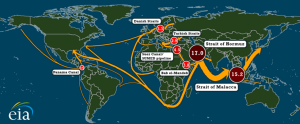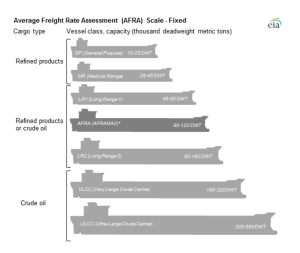Ежедневно через Турецкие проливы проходит 2,9 миллиона баррелей нефти и нефтепродуктов. Справка на английском, но текст простенький, сами разберётесь.

Increased oil exports from the Caspian Sea region make the Turkish Straits one of the busiest chokepoints in the world. Oil through these straits supplies Western and Southern Europe.
The Turkish Straits, which includes the Bosporus and Dardanelles waterways, divide Asia from Europe. The Bosporus is 17-mile waterway that connects the Black Sea with the Sea of Marmara. The Dardanelles is a 40-mile waterway that links the Sea of Marmara with the Aegean and Mediterranean Seas. Both are located in Turkey and supply Western and Southern Europe with oil from Russia and the Caspian Sea Region.
An estimated 2.9 million bbl/d flowed through the Turkish Straits in 2013. About 70% of this volume was crude oil and the remainder was petroleum products. These Black Sea ports are among the primary oil export routes for Russia and other Eurasian countries, including Azerbaijan and Kazakhstan.
Oil shipments through the Turkish Straits decreased from more than 3.4 million bbl/d at its peak in 2004 to 2.6 million bbl/d in 2006 as Russia shifted crude oil exports toward the Baltic ports. Traffic through the Turkish Straits increased from 2010-2011 as crude production and exports from Azerbaijan and Kazakhstan increased.

Only half a mile wide at the narrowest point, the Turkish Straits are among the world’s most difficult waterways to navigate because of their sinuous geography. About 48,000 vessels transit the straits each year, making this area one of the world’s busiest maritime chokepoints.
Commercial shipping has the right of free passage through the Turkish Straits in peacetime, although Turkey claims the right to impose regulations for safety and environmental purposes. Bottlenecks and heavy traffic also create problems for oil tankers in the Turkish Straits. Turkey has raised concerns over the navigational safety and environmental threats to the Turkish Straits, and the country has suggested that an alternate route could be developed between the Black Sea and the Sea of Marmara.